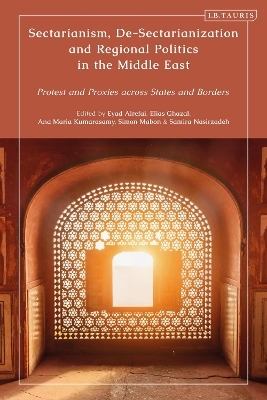
Sectarianism, De-Sectarianization and Regional Politics in the Middle East
I.B. Tauris (Verlag)
978-0-7556-3917-5 (ISBN)
To do so, the volume provides a comparative account, looking at Iraq, Bahrain, Yemen, Syria and Lebanon. It examines the ways in which sect-based difference shapes regional politics and vice versa. The book also contributes to burgeoning debates on the role of protest movements in sectarianism. Chapters are split across three main sections: the first looks at sects and states; the second traces the relationship between sects and regional dynamics; and the third examines de-sectarianization, that is, the contestation and destablization of sectarian identities in socio-political life. Each section provides a more holistic understanding of the role of sectarian identities in the contemporary Middle East and shows how sectarian groups operate within and across state borders, and why this has serious implications for the ordering of life across the Middle East.
Samira Nasirzadeh is a PhD candidate in International Relations at Lancaster University, UK where she is currently working as a fellow at the Richardson Institute. Ana Maria Kumarasamy is a PhD candidate at Lancaster University, where she is currently working as a coordinator at the Richardson Institute. She is also a PhD fellow at SEPAD, the sectarianism, proxies and de-sectarianisation project. Elias Ghazal is a PhD candidate in International Relations at Lancaster University. He is currently working as a fellow at the Richardson Institute and he is a PhD fellow at SEPAD, the sectarianism, proxies and de-sectarianisation project. Eyad Alrefai is a Ph.D. candidate in Politics and International Relations at Lancaster University where he ia a fellow at the Sectarianism, Proxies and De-sectarianisation (SEPAD) project.
Introduction, Sectarianism, geopolitics and De-Sectarianization in the Middle East, Simon Mabon., University of Lancaster, UK; & Ana Kumarasamy, University of Lancaster, UK
Section I: Politics of Sectarinianism
Chapter 1: Politics of Sectarinism in Iraq, Harith Hasan, The Carnegie Middle East Center, USA
Chapter 2: Taif at Thirty: A Revolution against Orientalism, Madonna Kalousian: Lancaster University, UK
Chapter 3: The Weakness of Sovereignty in Authoritarian Regimes, Samuel Peter Mace, Leeds University, UK
Chapter 4: De-essentializing Sectarianism: A Study of Iran’s Regional Politics, Chimat Ladol, Jawaharlal Nehru University, UK
Section II: Regional Dynamics & Proxies
Chapter 5: The Spectre of Geopolitically Charged Sectarianism, Ibrahim Halawi, Royal Holloway, UK
Chapter 6: The Deal of Discontent Saudi Arabia, Iran & the Nuclear Deal, Olivia Isabell Glombitza, Universitat Autònoma de Barcelona, UK
Chapter 7: Securitization through Sectarianization in Bahrain, Samira Nasirzadeh, Lancaster University, UK
Chapter 8: Bridging Ethno-Religious Divides by Proxy? Non-State Sponsorship and Sectarianism in the Middle East, Michel Wyss, Military Academy, Switzerland
Chapter 9: The Importance of Framing Conflicts-Building the Narrative of a Proxy War in Yemen, Maria-Louise Clausen: Danish Institute for International Studies, Denmark
Chapter 10: Sectarianism and Civil Wars in the MENA Region, Francesco Belcastro: University of Derby, UK
Section III: De-sectarianization
Chapter 11: Iran’s Soft Power in the Gulf from Islamic Revolution to Post Intra Gulf Crisis, Nesibe Hicret Battaloglu, Middle East Technical University, Turkey
Chapter 12: Discursive De-Secterianization: Re-Ordering Saudi Foreign and Domestic Policy Making, Umer Karim, University of Birmingham, UK
Chapter 13: How to Understand the Role of Al-Azhar in the Sunni-Shi'i Rapprochement?, Hossam Ed-Deen Allam, Lancaster University, UK
Conclusion, Samira Nasirzadeh, University of Lancaster, UK; Elias Ghazal, University of Lancaster, UK; Eyad Alrefai, University of Lancaster, UK; Ana Kumarasamy, University of Lancaster, UK
| Erscheinungsdatum | 09.01.2024 |
|---|---|
| Sprache | englisch |
| Maße | 156 x 234 mm |
| Themenwelt | Geisteswissenschaften ► Geschichte ► Regional- / Ländergeschichte |
| Sozialwissenschaften ► Politik / Verwaltung ► Politische Systeme | |
| Sozialwissenschaften ► Politik / Verwaltung ► Politische Theorie | |
| ISBN-10 | 0-7556-3917-0 / 0755639170 |
| ISBN-13 | 978-0-7556-3917-5 / 9780755639175 |
| Zustand | Neuware |
| Informationen gemäß Produktsicherheitsverordnung (GPSR) | |
| Haben Sie eine Frage zum Produkt? |
aus dem Bereich


